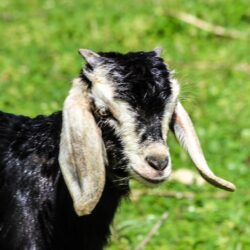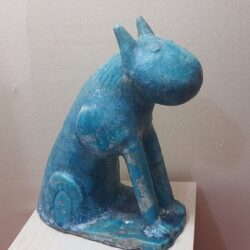Some notes for those unfamiliar with the incredibly complicated world of Tamaziɣt pronunciation:
- A dot below, as in ḅ, ṛ, or ẓ, means the letter is velarized a la Mizraḥi ח, ט, or צ. The Tamaziɣt languages allow almost every sound to be velarized, unlike Semitic languages which limit velarization to several letters. The closest English parallel would be to read those letters in a very creaky voice.
- š is equivalent to /ʃ/. as in “sheesh.”
- ɣ is a sort of rolled g, very close to the modern Israeli Hebrew back pronunciation of ר.
- ă is a rounded /ɔ/, as in “dog” in a New York accent.
- ʕ is a pharyngeal sound like a Mizraḥi ע.
- Doubled letters are geminated (aka lengthened).
| Source (Aramaic) | Translation (Tifinagh/Berber) | Hebraization (Judeo-Tamaziɣt/Berber) | Romanization (Tamaziɣt-Latin) | Translation (English) |
|---|---|---|---|---|
חַד גַּדְיָא, דְּזַבִּן אַבָּא בִּתְרֵי זוּזֵי, חַד גַּדְיָא, חַד גַּדְיָא. |
ⵢⴰⵏ ⵉⴽⵔⵓ ⵢⴰⵏ ⵉⴽⵔⵓ ⵉⵙⵖⴰⵢⵜ ⴱⴱⴰ ⵙⵙⵉⵏ ⵉⵇⴰⵔⵉⴷⴻⵏ ⵢⴰⵏ ⵉⴽⵔⵓ ⵢⴰⵏ ⵉⴽⵔⵓ |
יַאן יִכְּרוּ יַאן יִכְּרוּ, יִסְגַית בָּא שִּׂין יִקַרִידְן, יַאן יִכְּרוּ יַאן יִכְּרוּ׃ |
Yan ikru yan ikru, isɣayt ḅḅă ssin iqaridǝn, yan ikru yan ikru. |
One little goat that my father bought for two zuzim, for two zuzim. |
וְאָתָא שֻׁנְרָא וְאָכְלָה לְגַדְיָא, דְּזַבִּן אַבָּא בִּתְרֵי זוּזֵי, חַד גַּדְיָא, חַד גַּדְיָא. |
ⵜⵓⵛⴽⴰⴷ ⵜⴱⵓⵙⵉ ⵜⴻⵙⵙⴰ ⵉⴽⵔⵓ ⵉⵙⵖⴰⵢⵜ ⴱⴱⴰ ⵙⵙⵉⵏ ⵉⵇⴰⵔⵉⴷⴻⵏ ⵢⴰⵏ ⵉⴽⵔⵓ ⵢⴰⵏ ⵉⴽⵔⵓ |
תוּשכַּד תבוּסִי תְשַּא יִכְּרוּ יִסְגַית בָּא שִּׂין יִקַרִידְן, יַאן יִכְּרוּ יַאן יִכְּרוּ |
Tuškad tbusi tǝssa ikru, isɣayt ḅḅă ssin iqaridǝn, yan ikru yan ikru. |
A cat came and ate the goat that my father bought for two zuzim, for two zuzim. |
וְאָתָא כַּלְבָּא וְנָשַׁךְ לְשֻׁנְרָא, דְּאָכְלָה לְגַדְיָא, דְּזַבִּן אַבָּא בִּתְרֵי זוּזֵי, חַד גַּדְיָא, חַד גַּדְיָא. |
ⵜⵓⵛⴽⴰⴷ ⵜⴰⵉⴷⵉⵜ ⵜⴻⴱⴱⵉ ⵜⴰⴱⵓⵙⵉ ⵜⴻⵙⵙⴰ ⵉⴽⵔⵓ ⵉⵙⵖⴰⵢⵜ ⴱⴱⴰ ⵙⵙⵉⵏ ⵉⵇⴰⵔⵉⴷⴻⵏ ⵢⴰⵏ ⵉⴽⵔⵓ ⵢⴰⵏ ⵉⴽⵔⵓ |
תוּשכַּד תַאיִדִית תְבִּי תַבוּסִי תְשַּא יִכְּרוּ יִסְגַית בָּא שִּׂין יִקַרִידְן, יַאן יִכְּרוּ יַאן יִכְּרוּ׃ |
Tuškad taidit tǝbbi tabusi tǝssa ikru, isɣayt ḅḅă ssin iqaridǝn, yan ikru yan ikru. |
A dog came and bit the cat that ate the goat that my father bought for two zuzim, for two zuzim. |
וְאָתָא חֻטְרָא וְהִכָּה לְכַלְבָּא, דְּנָשַׁךְ לְשֻׁנְרָא, דְּאָכְלָה לְגַדְיָא, דְּזַבִּן אַבָּא בִּתְרֵי זוּזֵי, חַד גַּדְיָא, חַד גַּדְיָא. |
ⵜⵓⵛⴽⴰⴷ ⵜⵇⵓⵕⴰⵉⴷⵉⵜ ⵜⵓⵜ ⵜⴰⵉⴷⵉⵜ ⵜⴻⴱⴱⵉ ⵜⴰⴱⵓⵙⵉ ⵜⴻⵙⵙⴰ ⵉⴽⵔⵓ ⵉⵙⵖⴰⵢⵜ ⴱⴱⴰ ⵙⵙⵉⵏ ⵉⵇⴰⵔⵉⴷⴻⵏ ⵢⴰⵏ ⵉⴽⵔⵓ ⵢⴰⵏ ⵉⴽⵔⵓ |
תוּשכַּד תקוּרָ֯אית תוּת תַאיִדִית תְבִּי תַבוּסִי תְשַּא יִכְּרוּ יִסְגַית בָּא שִּׂין יִקַרִידְן, יַאן יִכְּרוּ יַאן יִכְּרוּ׃ |
Tuškad tquṛăidit tut taidit tǝbbi tabusi tǝssa ikru, isɣayt ḅḅă ssin iqaridǝn, yan ikru yan ikru. |
A stick came and hit the dog that bit the cat that ate the goat that my father bought for two zuzim, for two zuzim. |
וְאָתָא נוּרָא וְשָׂרַף לְחֻטְרָא, דְּהִכָּה לְכַלְבָּא, דְּנָשַׁךְ לְשֻׁנְרָא, דְּאָכְלָה לְגַדְיָא, דְּזַבִּן אַבָּא בִּתְרֵי זוּזֵי, חַד גַּדְיָא, חַד גַּדְיָא. |
ⵜⵓⵛⴽⴰⴷ ⵍⴰⵄⴼⵉⵜ ⵜⴻⵥⴷⴻⵔ ⵜⵇⵓⵕⴰⵉⴷⵉⵜ ⵜⵓⵜ ⵜⴰⵉⴷⵉⵜ ⵜⴻⴱⴱⵉ ⵜⴰⴱⵓⵙⵉ ⵜⴻⵙⵙⴰ ⵉⴽⵔⵓ ⵉⵙⵖⴰⵢⵜ ⴱⴱⴰ ⵙⵙⵉⵏ ⵉⵇⴰⵔⵉⴷⴻⵏ ⵢⴰⵏ ⵉⴽⵔⵓ ⵢⴰⵏ ⵉⴽⵔⵓ |
תוּשכַּד לַעְפִית תְז֯דְר תַקוּרָ֯אית תוּת תַאיִדִית תְבִּי תַבוּסִי תְשַּא יִכְּרוּ יִסְגַית בָּא שִּׂין יִקַרִידְן, יַאן יִכְּרוּ יַאן יִכְּרוּ׃ |
Tuškad laʕfit tǝẓdǝr tquṛăidit tut taidit tǝbbi tabusi tǝssa ikru, isɣayt ḅḅă ssin iqaridǝn, yan ikru yan ikru. |
A fire came and burned the stick that hit the dog that bit the cat that ate the goat that my father bought for two zuzim, for two zuzim. |
וְאָתָא מַיָּא וְכָבָה לְנוּרָא, דְּשָׂרַף לְחֻטְרָא, דְּהִכָּה לְכַלְבָּא, דְּנָשַׁךְ לְשֻׁנְרָא, דְּאָכְלָה לְגַדְיָא, דְּזַבִּן אַבָּא בִּתְרֵי זוּזֵי, חַד גַּדְיָא, חַד גַּדְיָא. |
ⵓⵛⴽⴰⵏⴷ ⵡⴰⵎⴰⵏ ⵙⴻⵅⵙⵉⵜ ⵍⴰⵄⴼⵉⵜ ⵜⴻⵥⴷⴻⵔ ⵜⵇⵓⵕⴰⵉⴷⵉⵜ ⵜⵓⵜ ⵜⴰⵉⴷⵉⵜ ⵜⴻⴱⴱⵉ ⵜⴰⴱⵓⵙⵉ ⵜⴻⵙⵙⴰ ⵉⴽⵔⵓ ⵉⵙⵖⴰⵢⵜ ⴱⴱⴰ ⵙⵙⵉⵏ ⵉⵇⴰⵔⵉⴷⴻⵏ ⵢⴰⵏ ⵉⴽⵔⵓ ⵢⴰⵏ ⵉⴽⵔⵓ |
אוּשכַּנד וַאמַן סְּכֿסִין לַעְפִית תְז֯דְר תַקוּרָ֯אית תוּת תַאיִדִית תְבִּי תַבוּסִי תְשַּא יִכְּרוּ יִסְגַית בָּא שִּׂין יִקַרִידְן, יַאן יִכְּרוּ יַאן יִכְּרוּ׃ |
Uškand waman sǝxsit laʕfit tǝẓdǝr tquṛăidit tut taidit tǝbbi tabusi tǝssa ikru, isɣayt ḅḅă ssin iqaridǝn, yan ikru yan ikru. |
Water came and put out the fire that burned the stick that hit the dog that bit the cat that ate the goat that my father bought for two zuzim, for two zuzim. |
וְאָתָא תּוֹרָא וְשָׁתָא לְמַיָּא, דְּכָבָה לְנוּרָא, דְּשָׂרַף לְחֻטְרָא, דְּהִכָּה לְכַלְבָּא, דְּנָשַׁךְ לְשֻׁנְרָא, דְּאָכְלָה לְגַדְיָא, דְּזַבִּן אַבָּא בִּתְרֵי זוּזֵי, חַד גַּדְיָא, חַד גַּדְיָא. |
ⵢⵓⵛⴽⴰⴷ ⵡⴰⴳⵯⵉ ⵉⵙⵡⴰ ⴰⵎⴰⵏ ⵙⴻⵅⵙⵉⵜ ⵍⴰⵄⴼⵉⵜ ⵜⴻⵥⴷⴻⵔ ⵜⵇⵓⵕⴰⵉⴷⵉⵜ ⵜⵓⵜ ⵜⴰⵉⴷⵉⵜ ⵜⴻⴱⴱⵉ ⵜⴰⴱⵓⵙⵉ ⵜⴻⵙⵙⴰ ⵉⴽⵔⵓ ⵉⵙⵖⴰⵢⵜ ⴱⴱⴰ ⵙⵙⵉⵏ ⵉⵇⴰⵔⵉⴷⴻⵏ ⵢⴰⵏ ⵉⴽⵔⵓ ⵢⴰⵏ ⵉⴽⵔⵓ |
יוּשכַּד וָגוִי יִשׂוַא אַמַן סְּכֿסִין לַעְפִית תְז֯דְר תַקוּרָ֯אית תוּת תַאיִדִית תְבִּי תַבוּסִי תְשַּא יִכְּרוּ יִסְגַית בָּא שִּׂין יִקַרִידְן, יַאן יִכְּרוּ יַאן יִכְּרוּ׃ |
Yuškad wăɣwi iswa aman sǝxsit laʕfit tǝẓdǝr tquṛăidit tut taidit tǝbbi tabusi tǝssa ikru, isɣayt ḅḅă ssin iqaridǝn, yan ikru yan ikru. |
An ox came and drank the water that put out the fire that burned the stick that hit the dog that bit the cat that ate the goat that my father bought for two zuzim, for two zuzim. |
וְאָתָא הַשּׁוֹחֵט וְשָׁחַט לְתוֹרָא, דְּשָׁתָא לְמַיָּא, דְּכָבָה לְנוּרָא, דְּשָׂרַף לְחֻטְרָא, דְּהִכָּה לְכַלְבָּא, דְּנָשַׁךְ לְשֻׁנְרָא, דְּאָכְלָה לְגַדְיָא, דְּזַבִּן אַבָּא בִּתְרֵי זוּזֵי, חַד גַּדְיָא, חַד גַּדְיָא. |
ⵢⵓⵛⴽⴰⴷ ⵍⵃⴻⵣⵣⴰⵏ ⵉⵖⴻⵔⵙ ⵡⴰⴳⵯⵉ ⵉⵙⵡⴰ ⴰⵎⴰⵏ ⵙⴻⵅⵙⵉⵜ ⵍⴰⵄⴼⵉⵜ ⵜⴻⵥⴷⴻⵔ ⵜⵇⵓⵕⴰⵉⴷⵉⵜ ⵜⵓⵜ ⵜⴰⵉⴷⵉⵜ ⵜⴻⴱⴱⵉ ⵜⴰⴱⵓⵙⵉ ⵜⴻⵙⵙⴰ ⵉⴽⵔⵓ ⵉⵙⵖⴰⵢⵜ ⴱⴱⴰ ⵙⵙⵉⵏ ⵉⵇⴰⵔⵉⴷⴻⵏ ⵢⴰⵏ ⵉⴽⵔⵓ ⵢⴰⵏ ⵉⴽⵔⵓ |
יוּשכַּד לחְזַּן יִגְרס וָגוִי יִשׂוַא אַמַן סְּכֿסִין לַעְפִית תְז֯דְר תַקוּרָ֯אית תוּת תַאיִדִית תְבִּי תַבוּסִי תְשַּא יִכְּרוּ יִסְגַית בָּא שִּׂין יִקַרִידְן, יַאן יִכְּרוּ יַאן יִכְּרוּ׃ |
Yuškad lḥǝzzan iɣǝrs wăɣwi iswa aman sǝxsit laʕfit tǝẓdǝr tquṛăidit tut taidit tǝbbi tabusi tǝssa ikru, isɣayt ḅḅă ssin iqaridǝn, yan ikru yan ikru. |
A butcher came and slaughtered the ox that drank the water that put out the fire that burned the stick that hit the dog that bit the cat that ate the goat that my father bought for two zuzim, for two zuzim. |
וְאָתָא מַלְאַךְ־הַמָּ֫וֶת וְשָׁחַט לְשׁוֹחֵט, דְּשָׁחַט לְתוֹרָא, דְּשָׁתָא לְמַיָּא, דְּכָבָה לְנוּרָא, דְּשָׂרַף לְחֻטְרָא, דְּהִכָּה לְכַלְבָּא, דְּנָשַׁךְ לְשֻׁנְרָא, דְּאָכְלָה לְגַדְיָא, דְּזַבִּן אַבָּא בִּתְרֵי זוּזֵי, חַד גַּדְיָא, חַד גַּדְיָא. |
ⵜⵓⵛⴽⴰⴷ ⵍⵎⵓⵜ ⵜⴻⵏⵖⴰ ⵍⵃⴻⵣⵣⴰⵏ ⵉⵖⴻⵔⵙ ⵡⴰⴳⵯⵉ ⵉⵙⵡⴰ ⴰⵎⴰⵏ ⵙⴻⵅⵙⵉⵜ ⵍⴰⵄⴼⵉⵜ ⵜⴻⵥⴷⴻⵔ ⵜⵇⵓⵕⴰⵉⴷⵉⵜ ⵜⵓⵜ ⵜⴰⵉⴷⵉⵜ ⵜⴻⴱⴱⵉ ⵜⴰⴱⵓⵙⵉ ⵜⴻⵙⵙⴰ ⵉⴽⵔⵓ ⵉⵙⵖⴰⵢⵜ ⴱⴱⴰ ⵙⵙⵉⵏ ⵉⵇⴰⵔⵉⴷⴻⵏ ⵢⴰⵏ ⵉⴽⵔⵓ ⵢⴰⵏ ⵉⴽⵔⵓ |
תוּשכַּד לְמוּת תְנגַא לחְזַּן יִגְרס וָגוִי יִשׂוַא אַמַן סְּכֿסִין לַעְפִית תְז֯דְר תַקוּרָ֯אית תוּת תַאיִדִית תְבִּי תַבוּסִי תְשַּא יִכְּרוּ יִסְגַית בָּא שִּׂין יִקַרִידְן, יַאן יִכְּרוּ יַאן יִכְּרוּ׃ |
Tuškad lmut tǝnɣa lḥǝzzan iɣǝrs wăɣwi iswa aman sǝxsit laʕfit tǝẓdǝr tquṛăidit tut taidit tǝbbi tabusi tǝssa ikru, isɣayt ḅḅă ssin iqaridǝn, yan ikru yan ikru. |
The Angel of Death came and slaughtered the shoḥet who slaughtered the ox that drank the water that put out the fire that burned the stick that hit the dog that bit the cat that ate the goat that my father bought for two zuzim, for two zuzim. |
וְאָתָא הַקָּדוֹשׁ־בָּרוּךְ־הוּא וְשָׁחַט לְמַלְאַךְ־הַמָּ֫וֶת דְּשָׁחַט לְשׁוֹחֵט, דְּשָׁחַט לְתוֹרָא, דְּשָׁתָא לְמַיָּא, דְּכָבָה לְנוּרָא, דְּשָׂרַף לְחֻטְרָא, דְּהִכָּה לְכַלְבָּא, דְּנָשַׁךְ לְשֻׁנְרָא, דְּאָכְלָה לְגַדְיָא, דְּזַבִּן אַבָּא בִּתְרֵי זוּזֵי, חַד גַּדְיָא, חַד גַּדְיָא. |
ⵢⵓⵛⴽⴰⴷ ⵕⴻⴱⴱⵉ ⵉⵏⵖⴰ ⵍⵎⵓⵜ ⵜⴻⵏⵖⴰ ⵍⵃⴻⵣⵣⴰⵏ ⵉⵖⴻⵔⵙ ⵡⴰⴳⵯⵉ ⵉⵙⵡⴰ ⴰⵎⴰⵏ ⵙⴻⵅⵙⵉⵜ ⵍⴰⵄⴼⵉⵜ ⵜⴻⵥⴷⴻⵔ ⵜⵇⵓⵕⴰⵉⴷⵉⵜ ⵜⵓⵜ ⵜⴰⵉⴷⵉⵜ ⵜⴻⴱⴱⵉ ⵜⴰⴱⵓⵙⵉ ⵜⴻⵙⵙⴰ ⵉⴽⵔⵓ ⵉⵙⵖⴰⵢⵜ ⴱⴱⴰ ⵙⵙⵉⵏ ⵉⵇⴰⵔⵉⴷⴻⵏ ⵢⴰⵏ ⵉⴽⵔⵓ ⵢⴰⵏ ⵉⴽⵔⵓ |
יוּשכַּד רְ֯בִּי יִנגַא לְמוּת תְנגַא לחְזַּן יִגְרס וָגוִי יִשׂוַא אַמַן סְּכֿסִין לַעְפִית תְז֯דְר תַקוּרָ֯אית תוּת תַאיִדִית תְבִּי תַבוּסִי תְשַּא יִכְּרוּ יִסְגַית בָּא שִּׂין יִקַרִידְן, יַאן יִכְּרוּ יַאן יִכְּרוּ׃ |
Yuškad ṛǝḅḅi inɣa lmut tǝnɣa lḥǝzzan iɣǝrs wăɣwi iswa aman sǝxsit laʕfit tǝẓdǝr tquṛăidit tut taidit tǝbbi tabusi tǝssa ikru, isɣayt ḅḅă ssin iqaridǝn, yan ikru yan ikru. |
Then the blessed Holy One came and slaughtered the Angel of Death who slaughtered the shoḥet who slaughtered the ox that drank the water that put out the fire that burned the stick that hit the dog that bit the cat that ate the goat that my father bought for two zuzim, for two zuzim. |
The earliest known appearance of “Ḥad Gadya,” by an unknown author, can be found in the Prague Haggadah (1526). The text of the poem is in a form of playful Aramaic and it is accompanied by the lyrics in medieval Yiddish.[1] The Jewish Encyclopedia (1906, NY) vol. 8 page 190 s.v. “Had Gadya” calls it German. It is unclear which, if either, came first — the Yiddish or the Aramaic. The Aramaic above below follows the text as it appears in the Prague Haggadah (1526). The Aramaic has been vocalized according to the Prague Haggadah (1590). Besides the transcription of the Aramaic with its vocalization, I have also added a translation sourced from Eve Levavi Feinstein’s Passover Haggadah translation. –Aharon N. Varady
Source
Had Gadya in Judeo-Berber (Handbook of Jewish Languages Revised and Updated Edition, Brill 2017)
Notes
| 1 | The Jewish Encyclopedia (1906, NY) vol. 8 page 190 s.v. “Had Gadya” calls it German. |
|---|

“חַד גַּדְיָא | ⵢⴰⵏ ⵉⴽⵔⵓ | Yan ikru (יַאן יִכְּרוּ) — a Judeo-Berber translation of Ḥad Gadya” is shared through the Open Siddur Project with a Creative Commons Attribution-ShareAlike 4.0 International copyleft license.











Leave a Reply